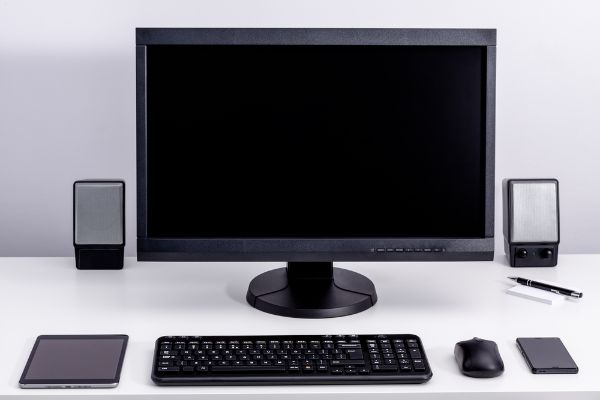Disclaimer: This post may contain affiliate links, meaning we get a small commission if you make a purchase through our links, at no cost to you. For more information, please visit our Disclaimer Page.
Computers have come a long way since their beginnings, but they are still electronic devices at their cores. If you are using a laptop, you have the advantage of running your system on battery power for a while, even though many people also choose to keep their laptops plugged into their main power supplies when possible. Unless you modify or add to their power sources, this is what traditional desktop computers need, too.
That means that they are susceptible to power outages that might occur throughout your home or office. Most of the time, these things happen due to some external factors, and they can creep up on you without warning.
However, some computer owners wonder if using or having the desktop powered up can somehow cause an outage of main power by itself. This is a theory we will explore in our article below.
Along the way, we will go over some of the common causes of power outages in general, what might happen to your PC if it is in an active state when the power cuts out, and whether you should unplug your computer during an outage.
Additionally, we will talk about what you might be able to do if you need to troubleshoot your computer not turning on after you’ve restored power to it, and we’ll go over some other things you might do to protect your device in the event of future outages.
Table of Contents
Can a PC Cause a Power Outage?
If you are running a new PC, or if you have made recent changes to the one you’ve always had, you might start to wonder if some of the power outages your home could experience have any relation to the computer itself.
In most cases, it isn’t likely that a computer will cause an outage on its own. However, you might face situations in which the load is heavy, and the amount of energy running through everything might trip the breaker.
In some apartments and homes, you have more than a single breaker. The power that goes to many of the outlets of your home will sync up with one of these. If too much power runs through one circuit at a given time, the breaker trips as a way to shut off power to that circuit.
It does this to prevent damage to the wiring itself, but it also has the potential to save your devices. A short in the line is a potentially dangerous situation that can produce sparks of electricity, smoke, or fires. The way developers make breakers allows them to stop the flow of electricity as a preventative measure.
It isn’t common for a personal computer to be the root cause of an outage, but it may be possible if the unit is drawing far more power than it did before. If that is the case, there could be a couple of issues to address. Even if you think your computer is the main culprit, it is almost certainly not the only device drawing power from the same fuse.
Whatever else might be running on that same line could also contribute to the problem. The flow of power from your computer’s supply is not necessarily a constant thing, either. It may fluctuate according to how much the device needs at a given moment.
If you are experiencing major blackouts that cause the whole house or apartment to lose power, you might be dealing with some very weak circuits or other electrical problems. Here, even if the desktop rig is a prime contributor, you may need to consult with a qualified electrician. Such professionals can help you determine if you need to make any changes to your home’s wiring.
Without this step, the problem is likely to continue, and you risk losing data or damaging your devices the longer everything goes on without any changes. If you are experiencing loss of power only in the same part of the home in which you use your computer, it could be that you need to have a professional add another fuse to help offset your energy needs.
What Happens if the Power Goes Out While the PC Is On?
With computers so integrated into daily life, it is possible that you’ve already experienced a sudden loss of power while you were working at your desktop.
Typically, the PC is not the only thing that such an outage affects, but the lack of energy flow means the whole thing will shut down. Your monitor will go blank, and you will probably hear your hard disk drive spinning down as it attempts to park its head following the sudden interruption.
These are the most noticeable things most people will see when a power outage happens during a computing session. However, before we get into what can really happen inside the case, we need to talk a bit about how typical energy flow for electricity works, and we need to touch on the types of anomalies that could occur.
Once we understand a bit more of that, we’ll have the knowledge we need in order to feel more secure about the possibility of outages happening when the computer is active.
Most homeowners are used to turning on any switch or device and having a stream of power flowing whenever they need it. Steady, reliable power is a staple of modern cities, and residents pay power companies to make sure that this is so.
However, behind the scenes, energy flow like this is not constant. The currents going in and out of your home can spike or dip. Both too much or too little can be problematic for some of the devices in your home.
The main issues that are going to cause these differences in power output are blackouts, brownouts, and surges. Usually, a blackout is something that will have an impact on more than just your home.
Multiple residences or streets might deal with it, and it is something that external forces tend to cause. There are situations, however, where you might accidentally overload a circuit and cause your own blackout.
Similarly, brownouts are dips in power that cause things like lights to dim, but the power doesn’t go out completely. If one of your devices receives far more voltage than it is supposed to for a minimum of three nanoseconds, then you have a surge on your hands.
If you lose power while the computer is on, your actual hardware may be okay. However, depending on what operations you were performing, you may lose data that you didn’t back up.
This could cost you a lot of time and effort, and it is a good idea to get into the habit of backing up your data regularly.
Furthermore, a sudden outage that comes into play when the desktop is on is not good for the operating system. Computers have specific steps they take when you shut them down properly, and an outage keeps them from performing those steps.
You may be able to start your computer normally, or it may face issues when it tries to boot. This is particularly true if any system files wanted to update when the outage happened.
Should I Unplug My PC During a Power Outage?
Although there might be some mitigating factors, it is never a bad idea to unplug your computer during a power outage. If you think a possible one might be on the way, all the better if you properly shut down your machine and unplug it before there is a loss of power.
The reason it is important to do this is that a voltage surge from the power coming back on could damage some parts of your computer. Many of the components inside your system have sensitive circuits that carry data from one place to another.
A surge that gives them far more energy than they can handle can burn them out beyond repair.
What Do I Do if My Computer Doesn’t Turn On After a Power Outage?
If your computer won’t turn on at all following an outage, here are a few things you can check:
1. Although it may seem obvious, check to make sure that you didn’t unplug the computer from its power supply during the outage period. If you did, plug it back in and try to turn on the device.
2. If you have the machine plugged in, try unplugging it and leaving it that way for a bit. Plug it back in and see if it turns on. If your computer has any kind of battery, take that out during this process.
Leave it for a while, then put it back in when you’re ready to turn the device on again.
3. Check the power supply itself. The PSU for your computer may suffer some damage from certain types of power outages, and it may fail to provide the energy your desktop needs in order to activate once again.
4. Try to see if the unit can at least do a POST test. Thanks to the speakers inside your computer, it should play a series of sounds when you try to boot it up. In some cases, the sounds can signal to you what kinds of errors are happening in the system.
How Do I Keep My PC Safe From Future Power Outages?
If you’re worried about the health of your computer after a recent outage, there are steps you can take to mitigate the risks following another one. You can’t prevent blackouts, but you can guard your devices against them.
One way you can do this is with an uninterruptible power supply. These UPS units feature backup batteries that can keep your PC powered when its main supply goes down.
The outlets surrounding them also have good surge protection to shield the device from voltage spikes when the power comes back on later. However, they are a short-term solution to power your device for a little while during an outage, so you can’t necessarily work on your computer normally just using a UPS.
You can also purchase general surge protectors to plug your devices into for extra insulation against voltage spikes.
Conclusion
Personal computers themselves should rarely be the root cause of power outages in the home. However, they can be the culprits if you have weak circuits, or they might contribute to the problem if you run several devices off the same fuse.
Make sure your home’s wiring can handle what your computer needs, and you should consider unplugging it during bad storms. You can also get some accessories that will help to ensure there isn’t a big risk of damage to the system if it is in the middle of something when the power goes out.


